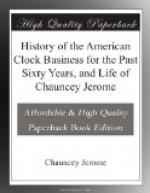After this I went to work at my trade, the Joiners business. I was still an apprentice; would not be twenty-one till the next June.
The War was not yet over, and in October, 1814, our Regiment was ordered by Governor Smith to New Haven, to guard the city. Col. Sanford, (father of Elihu and Harvey Sanford of this city,) commanded us. On arriving, we were stationed at the old slaughter-house, in the Eastern part of the city, at the end of Green street. All the land East of Academy street was then in farmers’ lots, and planted with corn, rye and potatoes now covered with large manufactories and fine dwellings. I little thought then, that I should have the largest Clock-factory in the world, within a stone’s throw of my sleeping-place, as has since proved. Nothing of much importance took place during our campaign at New Haven. The British did not land or molest us. We built a large fort on the high grounds, on the East Haven side, which commanded the Harbor, the ruins of which can now be seen from the city. A good deal of fault was found by the officers and men with the provisions, which were very poor. When this campaign closed I was through with my military glory, and returned to my home, sick and disgusted with a soldier’s life. I hope our country will not be disgraced with another war.
All of the old people will remember what a great rejoicing there was through the whole country, when peace was declared in February, 1815. I was married about that time to Salome Smith, daughter of Capt. Theophilus Smith, one of the last of the Puritanical families there was in the town; she made one of the best of wives and mothers. She died on the 6th of March, 1854. We lived together 39 years. A short time after we were married, I moved to the town of Farmington, and hired a house of Mr. Chauncey Deming to live in, and went to work for Capt. Selah Porter, for twenty dollars per month. We built a house for Maj. Timothy Cowles, which was then the best one in Farmington. I was not worth at this time fifty dollars in the world.
1815, the year after the war, was, probably the hardest one there has been for the last hundred years, for a young man to begin for himself.
Pork was sold for thirteen dollars per hundred, Flour at thirteen dollars per barrel; Molasses was sold for seventy-five cents per gallon, and brown Sugar at thirty-four cents per pound. I remember buying some cotton cloth for a common shirt, for which I paid one dollar a yard, no better than can now be bought for ten cents. I mention these things to let the young men know what a great change has taken place, and what my prospects were at that time. Not liking this place, I moved back to Plymouth. I did not have money enough to pay my rent, which however, was not due until the next May, but Mr. Deming, who by the way, was one of the richest men in the State, was determined that I should not go till I had paid him. I promised him that he should have the money




